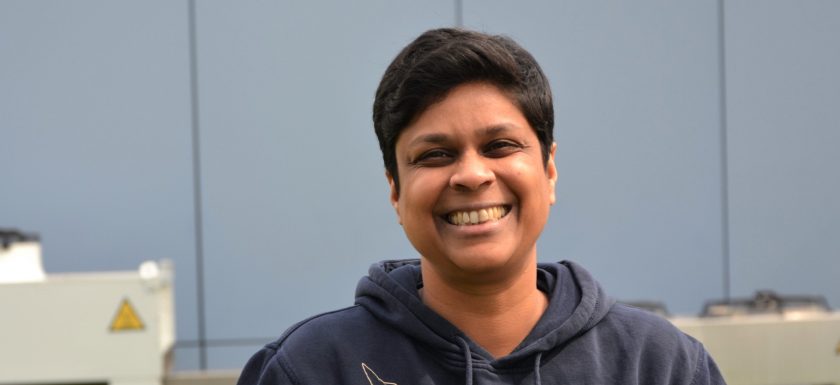
Aarthi Nandy studied chemical engineering at the University of Bath in England and then lived and worked in the UK for several years. Aarthi Nandy has been working at HZB since March 2021, first in the procurement team of the dismantling project and now in the user coordination department. A talk about privilege at work and in professional context.
What do you do at HZB?
Since February 2023, I have been in the User Coordination department, which looks after measurement guests from all over the world. I am responsible for quality management. Our users are very international, which is very exciting! I’m also the deputy equal opportunities officer at HZB.
At what points in your work does diversity play a role?
Diversity plays an important role in all areas of my life, both professionally and privately. Particularly in my work as deputy equal opportunities officer, I accompany recruitment processes and job interviews across departments, in which people with very different backgrounds and life paths introduce themselves. It is a matter close to my heart to proactively work for equal opportunities for all candidates and colleagues.
What is important to you about diversity?
The issue of privilege is clearly at the forefront of my mind. I think it is very important that we reflect more on our own privilege and address them more often in the work context. People classified as “non-normative” have a much harder time gaining a foothold in the world of work. For example people with a migration background or “people of colour”, people perceived as “queer” or “handicapped”, people who have to deal with language barriers or people who do not have degrees recognised in the EU.
There are barriers that are often not visible to others. Society would have to be more aware of the different starting conditions that people bring with them. Therefore, we should not only look at the qualifications, but also at the life paths of the applicants. Many come to their profession in a roundabout way and should be given opportunities, precisely because they bring fresh perspectives and a wealth of life experience with them.
What aspect of diversity should HZB be more committed to?
I would like to see more visibility and representation of deprived people at HZB, for example more women* in leadership positions and more permanent people of colour in key positions. The provision of gender-neutral toilets and the extended use of gender-reflective language are also important to me. In general, we need to create more awareness. We should also be able to talk openly about dealing with illnesses or mental stress. And we should always take accessibility into account so that we don’t exclude people.
This interview was conducted by Silvia Zerbe.
Privilege at work: when it’s just easier sometimes.
Often, we talk (for a good reason!) about discrimination and about the barriers that different non-privileged people face. But often, we forget to address what it means to have certain privileges. In short, to be privileged is to benefit from advantages that other people are denied. And this is simply because of certain characteristics that one has. In the work context, these privileges show themselves, for example, in higher positions and salaries, or in better working conditions.
Privilege can also be very simple. If you are perceived as male, you don’t worry about your clothes because you won’t be judged for it. Or if, as part of a heterosexual relationship, you don’t have to worry about your partner coming over during lunch break. Or when, as a person who is perceived as German, you can afford to use bumpy language without having to fear that your competence will be denied.
One thing all these privileges have in common: They are mostly invisible to privileged positions. As a privileged person, you often don’t think about the fact that right now, at this very second, you have it easier than others. Simply because you had the privilege of being born with certain advantageous characteristics.
Recognising one’s own privilege and acknowledging the experiences of non-privileged colleagues is essential for good cooperation. Together, we can stand up for equal opportunities and rights and fight to break down barriers.
The emancipation of non-privileged people requires a holistic approach that works on an individual, organisational and societal level. Addressing privilege and actively working to create more equitable workplace environments, we can contribute to a more inclusive society.
Written by Ribal Zeitouni.
This blogpost is part of a series on Diversity. You can find further articles here.
